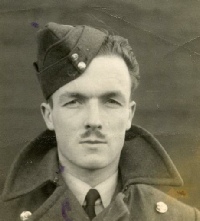
The wartime exploits of
Warrant Officer George ‘Bill’ Barnett R.A.F.
as told by his son, Gerald Barnett
A Modest Hero
 Photo Gallery
Photo Gallery
Prologue by Gerald Barnett
Growing up I knew that my Dad had been “shot down” in the war before I was born but I did not appreciate that it was in a bitterly cold section of the North Sea. I did not comprehend fully how he had saved his best mate who could not swim. I had no understanding of his three year separation from my Mum and sister who was only 4 when he became a Prisoner of War nor the deprivations the incarceration caused. I learned only recently the facts about his forced marches, with over 500 miles covered during one of the coldest winters of the century. He did not speak about it because he was a very modest hero.
Both of these attributes proved to be invaluable and even life-
He was then recruited by British Rail as a Paint Inspector, a job that then included
sign-
In 1936 love was in the air, when he met Florence “Flo” the daughter of Charlie Langley who was the Landlord of the Elm Tree Inn which was on the same West End Street as Bill’s home. They courted, realised they were meant for each other and were subsequently married on 20th February 1937 when he was 20 and she was 17, almost 18, so very young by 21st century standards but considered quite normal at that time. They continued to live in the West End and towards the end of that year their first child, Christine “Chris” was born, less than 9 months after the wedding!
In August 1939 the family moved to 29 Derwent Avenue in Allestree, which was then a small village on the outskirts of Derby. It was a three bedroomed detached house which although not brand new, was part of a new housing development in the 30s. At the rear was farmland with nothing but fields for several miles. Bill bought the house jointly with his Father – again, an unusual practice by today’s norms. That meant there were 4 adults, a teenage Beattie and toddler Chris in one property when war was declared on 3rd September by Prime Minister Chamberlain who announced to the British people that a state of war existed between their country and Germany.
World War II had begun.
His Early Life
George William Barnett was born in Ambergate, Derbyshire on 5th June 1916. Everyone knew him as Bill, apart from his close family who always called him Billie.
In his childhood, Bill was a frequent visitor to Great Longstone in the Peak District where his Grandfather had been the village Shoemaker and his uncle was the Head Gardener at Longstone Hall.
However, his Father’s job as a railway signalman took the family, which included his sister Beattie who was 9 years his junior, to the old West End of Derby, specifically 81 Watson Street.
At Kedleston Road Boys School he excelled in two fields: sport, particularly football and swimming, and art of all kinds. He was so good at the latter that he transferred to the Derby School of Arts and Crafts in 1931 where by the age of 15 and 16 he was top of the class in Art and a prize winner in several artistic and design categories.
Sergeant ‘Bill’ Barnett RAF